A 62-year-old man was referred to an orthopedist for hip pain.
Assessment revealed severe left hip osteoarthritis.
He underwent a series of hip injections.
Ultimately a total hip replacement was recommended.
The patient specifically asked about the possibility of an anterior approach for this surgery, as opposed to the more common posterior approach.
The orthopedic surgeon was attending a class to learn the anterior approach the month before the patient’s surgery, and agreed to the anterior approach.
It appears that the surgeon was forthcoming about his limited experience with the anterior approach and appropriately disclosed this to the patient.
Join 7100+ physicians on the email list.
Free and paid subscriptions available.
As can be surmised from the simple fact that you’re reading a medical malpractice newsletter, the surgery did not go well.
There was extensive blood loss, multiple perforations of the femoral shaft, and the surgeon documented that it was “very frustrating”.
The surgery was planned for 2 hours and ultimately took 8 hours.
6 weeks the later the patient was brought back for a revision via the posterior approach.
The patient was upset about the bad outcome and need for revision.
He hired a law firm and sued the orthopedic surgeon.
The plaintiff’s expert opinion is shown below:
The plaintiff’s expert was deposed by the defense attorney.
The expert’s bill for the deposition (paid by the defense law firm) is shown below:
Broaden your medicolegal expertise and stand out among your peers.
Subscribe today.
The defense hired their own expert witness to refute the claims of negligence.
His fee schedule is shown below:
Note that he is charging the defense:
$3,000 for the initial review
$6000 for a one hour deposition
$15,000 for the first day of court testimony
The plaintiff’s attorney wanted to depose the defense expert, but felt that the $6,000 fee for the first hour alone was unreasonable.
They filed a motion asking the judge to reduce the defense expert’s fee:
The defense firm countered that they had already paid the plaintiff’s (retired) expert $1200/hr, so their (actively working) expert should be paid a higher amount.
The judge decided that the appropriate fee for the defense’s expert was a flat rate of $1350/hr.
This case illustrates the value of reviewing malpractice cases from a broad spectrum of specialties.
Most doctors don’t need to know all the minutiae of a hip replacement.
However, understanding a few basics about the different techniques, reading highlights from the surgeon’s charting, and seeing the fight about the expert’s fees provides valuable insights.
The plaintiff offered to settle the case before trial for $2,000,000.
MedMalReviewer Analysis:
The posterior approach is more common and provides better visualization of the joint, but goes through the gluteus maximus. The anterior approach is less common and more challenging, but theoretically allows less muscle damage and causes less pain (when done successfully).
The patient specifically requested the anterior approach. The surgeon was fully transparent with the patient about his limited expertise and the fact that he was taking a class to learn this technique. The surgeon appears to have been very open and direct in his communication with the patient and his family, as well as in his medical documentation. It is very disheartening that the surgeon’s honesty is now being used against him.
Nobody wishes to be on the receiving end of a bad outcome, but having an emotionally mature physician who does not try to hide or obfuscate their role is critical in moving forward. Lawsuits like this only serve to sew distrust between doctors and patients.The judge reduced the defense expert’s reimbursement by almost 80% (when looking at the first hour of the deposition). The expert witness fees are some of the highest I’ve seen, even among the surgical specialties.
Those who work as expert witnesses need to understand that just because a law firm agrees to your fee schedule, doesn’t mean the opposing counsel will actually end up paying that amount.The $2,000,000 settlement offer is exorbitant. No one died, and the surgeon did a revision to restore as much function as possible. I hope this settled for a fraction of this offer.
Previous Cases:
Tibial Plateau Fracture [Subscribers Only]
Lady falls off ladder while being attacked by bees. Tibial plateau fracture promptly diagnosed but allegedly not repaired appropriately by her orthopedist, causing nonunion and varus malalignment.
Eye Infection - Patient Goes Blind
51-year-old woman treated for months for keratitis. Ultimately diagnosed with acanthamoeba keratitis and loses vision in the affected eye.
Missed Hodgkin Lymphoma [Subscribers Only]
CXR reveals a mediastinal mass on a 61-year-old woman, but patient is never informed of these results or referred for follow-up. She is later diagnosed with Hodgkins lymphoma. Plaintiff’s attorney withdraws (possibly due to patient’s unprofessional behavior and letters) and lawsuit is dismissed.

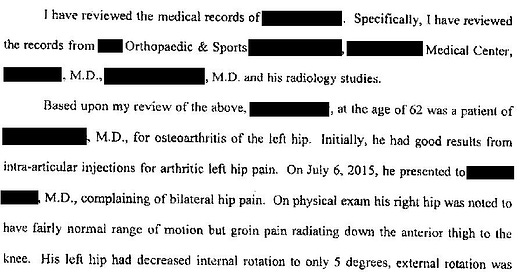



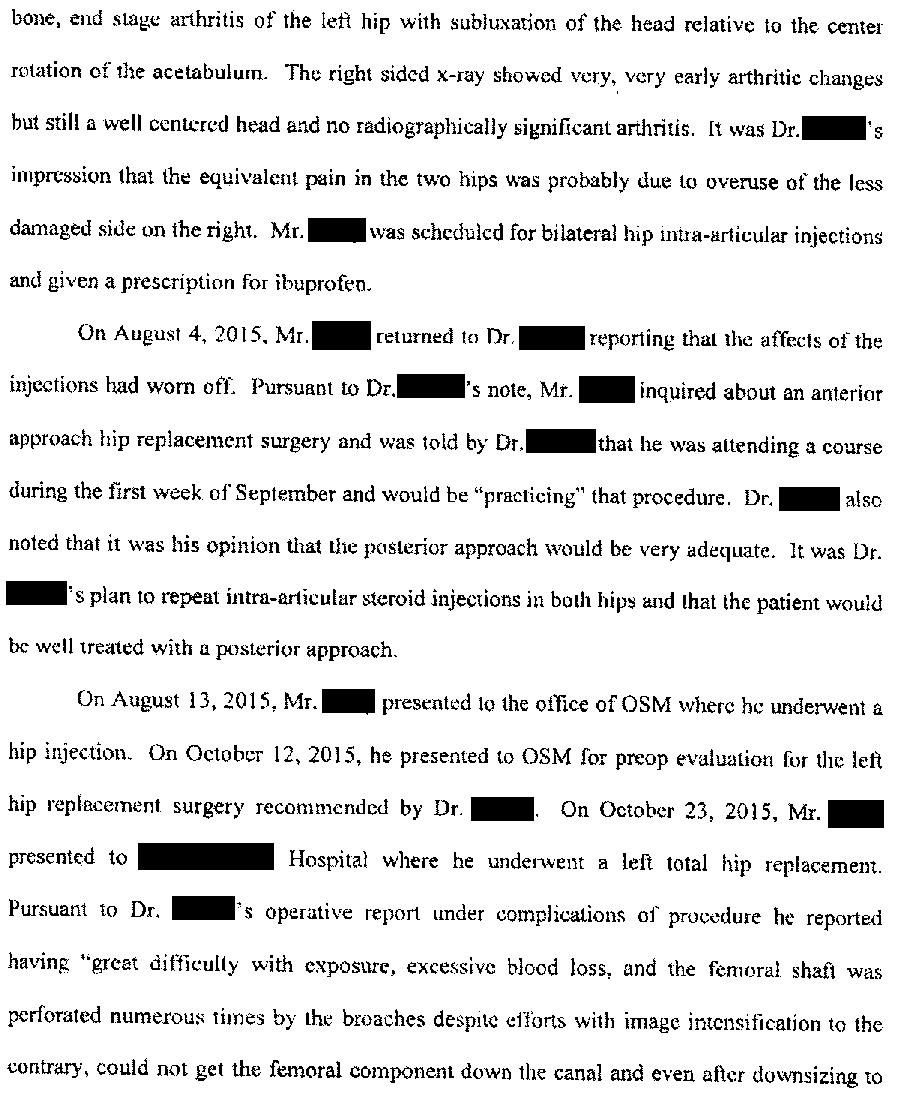

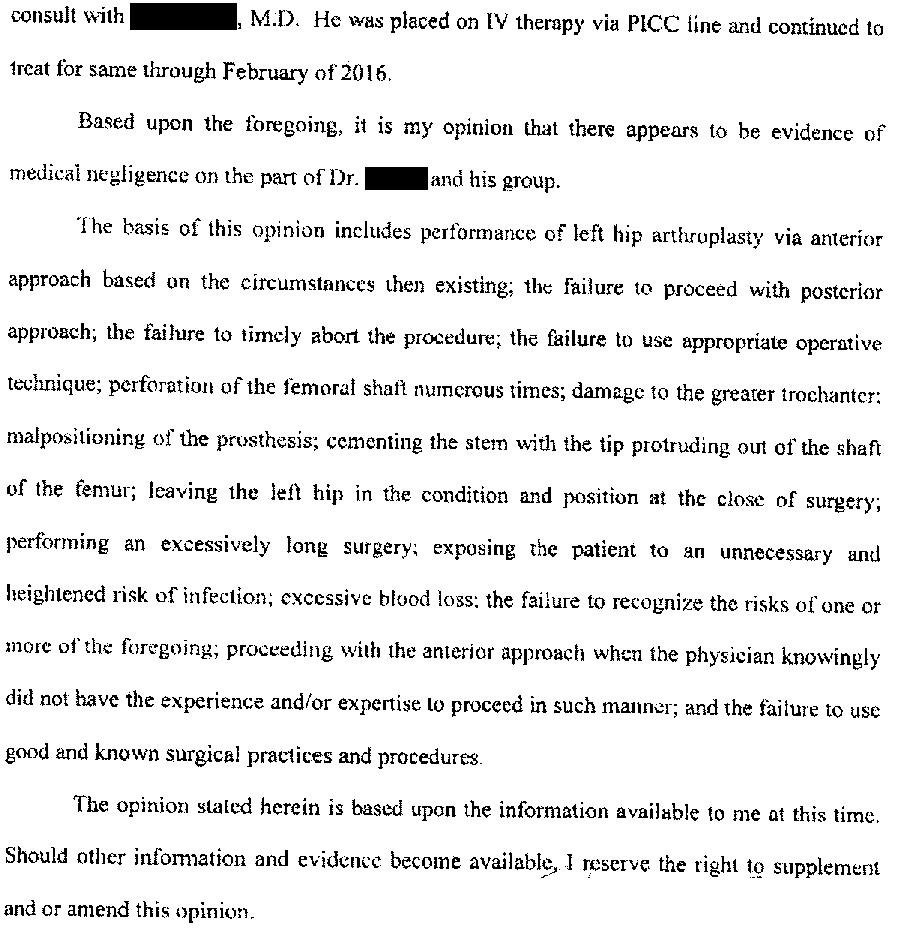
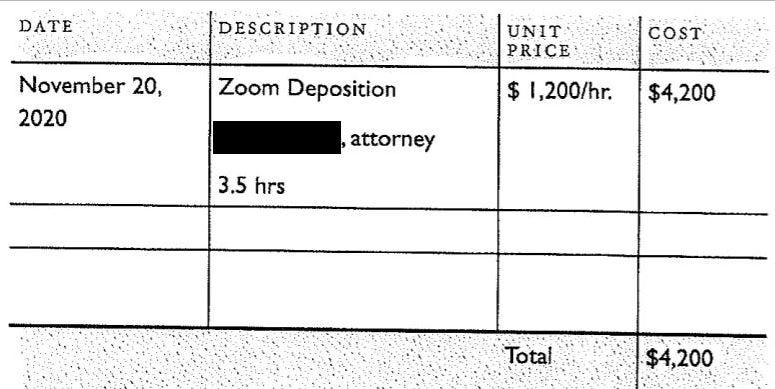

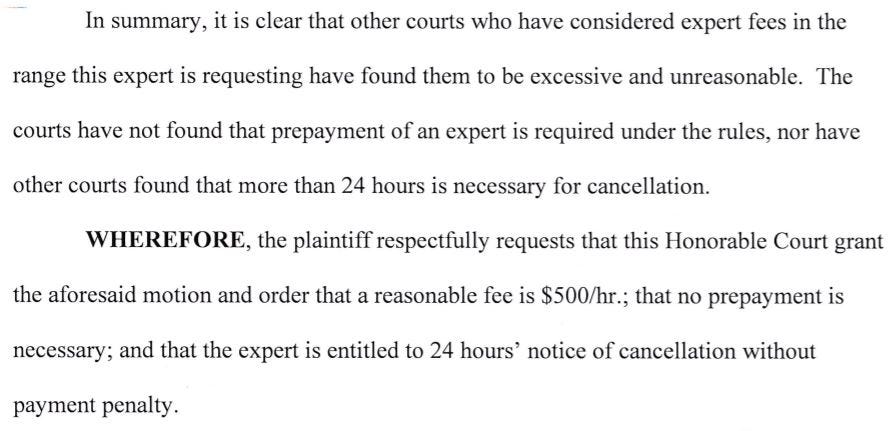
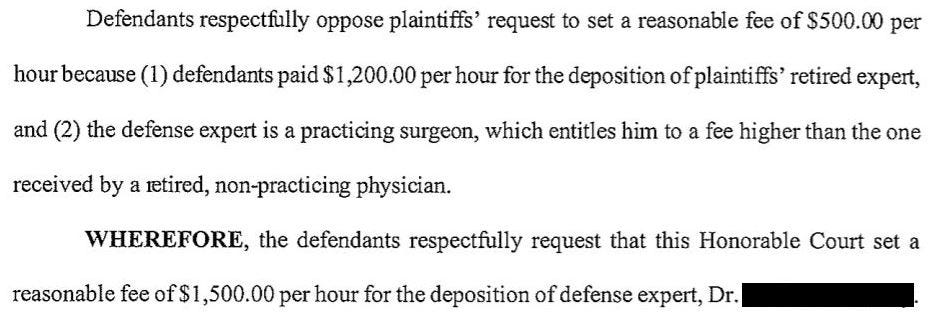


As a Board Certified Orthopedic Surgeon I performed hundreds of total hips via an anterolateral approach. I found it very difficult to transition to performing an anterior approach. There is a steep learning curve and I went to several instructional courses that included cadaveric experience and also went through a mentorship process with a younger colleague who had extensive experience. The patients age, and especially their body habitus, also play a role in exposure of the hip socket and proximal femur.
His honesty is no excuse for not being prepared to perform a safe, efficient procedure that minimizes complications. I honestly feel this surgeon was not at all prepared to perform this procedure, especially alone. It is a horrible feeling in the OR when a procedure is not going well, for whatever reason, but the best thing to do is abort the procedure before you make things worse. I feel that this is gross negligence on the surgeons part and hopefully he learns from this and becomes a better surgeon.
It is incredibly frustrating how the malpractice and tort law has been taken to the next level. It is evident in this case that the patient knew the risk From infection, pain, and no complete restoration of the patient's surgical condition. Furthermore, The surgeon was precise with the patient and family about the risks and benefits. Why wasn't this conversation and documents brought up during discovery? This case should have been thrown out. The expert witness should
have you been grilled extensively; Dr. Expert Witness, Have you ever had to performed a revision in any of your own joint procedures? That screamed relevance to any objection.